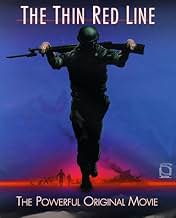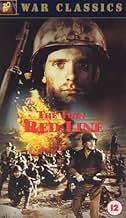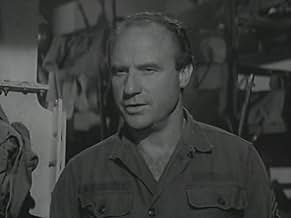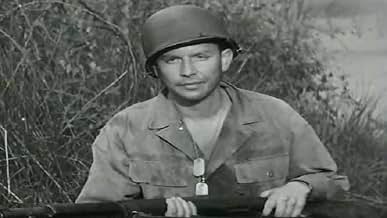VALUTAZIONE IMDb
6,7/10
894
LA TUA VALUTAZIONE
Aggiungi una trama nella tua linguaIn Guadalcanal during World War II, a private and his sergeant clash during the heat of battle with the Japanese.In Guadalcanal during World War II, a private and his sergeant clash during the heat of battle with the Japanese.In Guadalcanal during World War II, a private and his sergeant clash during the heat of battle with the Japanese.
Bob Kanter
- Fife
- (as Robert Kanter)
Jim Gillen
- Capt. Gaff
- (as James Gillen)
Stephen Young
- Stack
- (as Stephen Levy)
Recensioni in evidenza
Grim psychological study of two Marines on Guadalcanal, each seemingly trying to top the other in body count of Japanese slain, not for God, country, or to win the war, but for the sheer joy of killing.
Extremely realistic combat sequences coupled with Dullea's excellent portrayal of the on-the-edge-of-madness Pvt. Doll make this one of my favorite war films.
Extremely realistic combat sequences coupled with Dullea's excellent portrayal of the on-the-edge-of-madness Pvt. Doll make this one of my favorite war films.
6PKC
A solid effort hampered by the the filmmaking conventions of that time. Some of the acting is amateurish, and the dialogue stilted. But it does confront the serious moral issues of war, unlike most war movies of that era. The theme is essentially the same as the current version -- that is, how does man endure in war? It presents several models for survival. Many of the scenes are exactly the same as in the 1998 version, though it includes others that are not found in Malick. This attempt focuses more on the relationship between Welsh (Jack Warden) and Doll (Keir Dullea). The music is awful, like something out of a cheesy 50s horror flick. Also, it's amazing how much Guadalcanal resembles the high desert of Southern California. But this is well worth a rent if one has the proper expectations...
This version of James Jones' book follows the plot of the novel closely and actually received very high praise from the author himself. Jones wrote a letter to the director saying "Very rarely does an author get to write a letter to a filmmaker to say that he has captured the author's intention to the highest level possible." Jones was very pleased with the outcome of this movie, while the 1998 version heavily strays from his book. For example, Witt and Walsh in the 1998 version both quote a lot from another Jones novel, called "From Here To Eternity", and not from "A Thin Red Line". The main storyline, namely the clash between the Private and his Captain, is almost completely left out of the Malick film. In making the book into a movie, the 1964 film succeeds. Which is not to say Malick didn't create a riveting film in 1998, he just didn't really turn the book into a movie.
Oops, I got this film by accident, I thought it was the 1998 version. After almost taking it back, I decided to watch it and was glad I did. This is really a very good film working on the characters and situations without having to rely on the star appeal or visual effects as modern films. Do yourselves a favour and repeat my mistake.
The first interpretation of James Jones' novel is an OK movie. Nothing really stuck with me, though. It condenses about five characters each into the two lead characters in order to make a well rounded film that fairly expresses Jones' ideas on men in war. It is an interesting psychological study on men, not under stress, but facing death, either from a distance, or up close. There are some great moments in this, and the acting is superb. I did think, though, that the sexual feelings of the novel did not translate so well into the early 60's film. The battle are also utterly unconvincing. Death is still portrayed as a somewhat painless event (with the near exception of one great scene), it leans more to the earlier gung ho war movies than, say, Paths of Glory or All Quiet on the Western Front. The battle scenes are ultimately silly and cartoonish. Two men climb a cliff because the valley below is mined. One knocks over a big rock that causes a chain reaction and all the rocks fall into the valley and clear the mine field. This kind scene is not meant to be surreal, so it loses on the realism scale. This is not the way Jones wanted war depicted. The kind of silly inventiveness of the battle scenes does not exist in all out combat. But, I must say, it does succeed in some scenes, and the performances are all great. I must also say that the end is extremely powerful. It made all the cheesey set pieces and battle scenes disappear from my mind. That last shot is the tone of Jones' novels, a tone From Here to Eternity got right all the way through, and Terrence Malick's Thin Red Line also successfully portrayed (But stepped away to alow contemplation, not to experience.) That last scene makes it a good movie, but it couldn've been done better. Actually, it was done better. I still recommend it. It has its ideas in the right place, but its execution is a bit showy and not realistic enough.
Lo sapevi?
- QuizThe film's title comes from James Jones's novel and, in turn, from an old saying. In the movie, Captain Stone, played by Ray Daley, says, "I remember an old Midwest saying, 'There's only a thin red line between the sane and the mad.' "
The original 'Thin Red Line' refers to the routing of a Russian cavalry charge by the Sutherland Highlanders 93rd (Highland) Regiment during the Battle of Balaklava on 25 October 1854, during the Crimean War.
- BlooperFor some reason the Japanese soldiers are at times are armed with German Schmeisser SMG's.
- ConnessioniFeatured in The 80th Annual Academy Awards (2008)
I più visti
Accedi per valutare e creare un elenco di titoli salvati per ottenere consigli personalizzati
- How long is The Thin Red Line?Powered by Alexa
Dettagli
- Tempo di esecuzione
- 1h 39min(99 min)
- Colore
- Proporzioni
- 2.35 : 1
Contribuisci a questa pagina
Suggerisci una modifica o aggiungi i contenuti mancanti


























